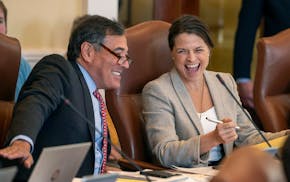MINNEAPOLIS - After a long and expensive campaign about the definition of marriage, Minnesotans vote Tuesday on whether the state constitution should be amended to prohibit same-sex couples from legally marrying in the state. No matter how the vote turns out, it's not likely to end the debate in Minnesota over what kind of couples should have legal access to marriage rights.
National polls have shown a steady climb in public approval of same-sex marriage rights, particularly among young voters. A handful of U.S. states have legalized gay marriage, and a number of challenges to same-sex marriage bans are moving through the federal court system on a likely path to the U.S. Supreme Court.
Amendment 1 as it appears on the ballot: "Shall the Minnesota Constitution be amended to provide that only a union of one man and one woman be valid or recognized as a marriage in Minnesota?"
Here are some common questions about the amendment, with answers:
___
Q: Is there any way that gay marriage could become legal in Minnesota on Election Day?
A: No. If the amendment passes, Minnesota's Constitution would deny legal marriage rights to same-sex couples. If it's defeated, the state's 1997 "Defense of Marriage" law prohibiting gay marriage would remain on the books.
Q: If gay marriage is still illegal either way, what's the point of the amendment?
A: Amendment supporters say the law could be overturned, either by a vote of the state Legislature or by a judicial ruling. If the amendment passes, it would take another statewide vote of the people to overturn it before gay marriage could become legal here.
Q: How soon could that possibly happen?
A: If the amendment passes but Democrats retake control of the Legislature, nothing would stop them from putting the issue right back on the 2014 ballot. There's a recent precedent for a turnaround that fast: In Maine, where voters struck down legal gay marriage in 2009, the issue is back on the ballot again this year. But that's not likely to happen in Minnesota as long as Republicans control one or both houses of the Legislature.
Q: How many votes does the marriage amendment need to pass?
A: It takes more than a simple majority. Under Minnesota law, for constitutional amendments to pass they must be approved by a majority of the total number of people who voted in that year's election. That means anyone who skips Amendment 1 is in effect voting against it. With recent statewide polls showing a close race and neither side exceeding 50 percent, that quirk of state law could come into play; the amendment could actually get more votes for it than against it, but still fail.
Q: How many states allow gay marriage?
A: Six, according to the Human Rights Campaign: Connecticut, Iowa, Massachusetts, New Hampshire, New York and Vermont. It's also legal in the District of Columbia. A dozen other states provide some recognition, either civil unions or full or limited domestic partnerships. In three states — Maine, Maryland and Washington — residents are voting Tuesday on whether gay marriages should be recognized. Minnesota provides no legal recognition for same-sex relationships.
Q: How many states prohibit gay marriage?
A: In all, 30 states have amended their constitution to limit marriage rights to heterosexual couples. Another 11 states, including Minnesota, have the ban in state law only. Opponents of gay marriage point out that in every state where the issue has gone to a vote of the people, they have voted down legal recognition of gay marriage. In states where it's legal, that's come via the Legislature or by a judicial ruling.
Q: If the amendment passes, could Minnesota still enact civil unions or domestic partnerships?
A: Yes. The amendment does not specifically prohibit future passage of civil unions under state law.
Q: What have been the main arguments for the amendment?
A: Supporters of the amendment view the traditional concept of marriage, between a man and a woman, as a longtime societal building block and also the best environment for raising children. They have also warned that legalizing gay marriage could create religious freedom conflicts for some people whose personal views conflict with government policy. They say that putting it in the constitution would ensure that any future attempt to redefine marriage would have to go back to voters first.
Q: What have been the main arguments against the amendment?
A: Its opponents say it is unfair, and no person should be told they can't marry the person they love. They also argue that the state constitution is intended to expand individual rights, not limit them; and that putting the ban in the constitution makes it too difficult to change.
Q: Where have amendment supporters drawn their biggest support?
A: Minnesota for Marriage has gotten strong support from the Catholic church, which has donated more than $1 million. Bishops have lent strong rhetorical and organizing support as well. The Minnesota Family Council and the National Organization for Marriage, socially conservative groups that strongly believe in a traditional definition of marriage, have also been major backers, along with hundreds of donations from individuals and churches.
Q: Where have amendment opponents drawn their biggest support?
A: Minnesotans United for All Families has drawn more individual donations, more than 60,000 at last count. They also have gotten major financial support from national gays rights groups as well as prominent Minnesota business leaders including Marilyn Carlson Nelson, executives at General Mills and other Fortune 500 companies who argue that a constitutional gay marriage ban would hurt their ability to recruit and retain a top-quality workforce.
The Latest | 12 jurors seated in Trump hush money case, selection of alternates ongoing

Rep. Ilhan Omar's daughter suspended from college for involvement in pro-Palestinian protests

